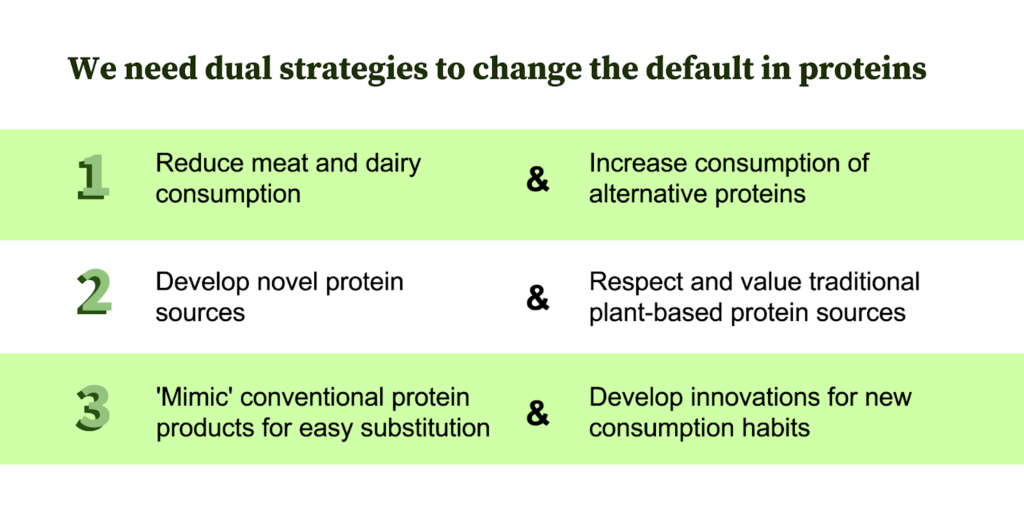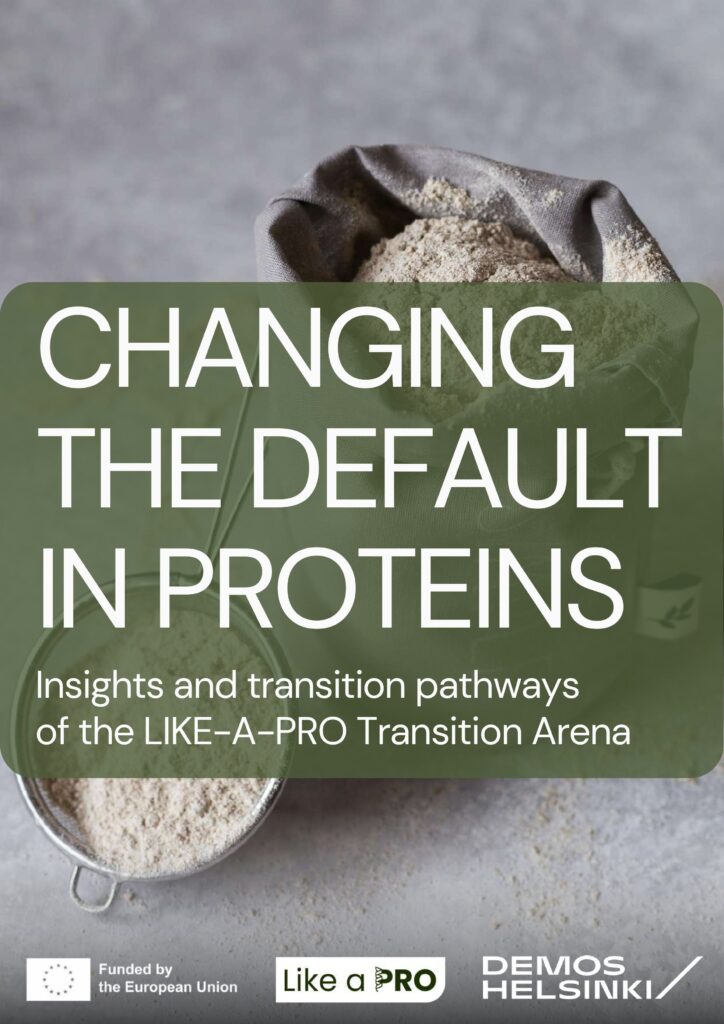This report, created in collaboration with the EU Horizon-funded LIKE-A-PRO project and over 50 food experts across sectors and regions, underscores the urgent need to change the default protein production and consumption within the next two decades.
What can we do within the next two decades to mainstream alternative proteins in Europe?
The message from over 50 frontrunning food actors from 22 different European countries is clear: we need to change the default in proteins. This new report, published by Demos Helsinki, suggests dual strategies and five transition pathways to make this shift a reality.
Despite growing commitments to tackling the ecological crises of our time, our eating habits are changing slowly. The EU’s food system faces significant challenges, particularly in protein production and consumption. Pressure for change grows from multiple directions:
- In 2020, agriculture contributed 11% of the EU-27’s total annual GHG emissions, with livestock as the main non-CO2 source.
- Regular meat consumption increases the risk of heart disease, pneumonia, diabetes, and other illnesses.
- EU leaders identified “increasing the EU production of plant-based proteins” as a means to improve the EU’s food security and reduce food prices amidst rising geopolitical tensions.
Alternative proteins offer a chance to address sustainability and health challenges in the EU, aligning with commitments and consumer interest. Despite increased product availability, European dietary patterns have yet to shift significantly. Transforming the food system requires sustained efforts across policy, industry, and society to phase out meat and dairy and mainstream sustainable alternatives, shaping cultural norms, market dynamics, and policy frameworks over time.
This is why we at Demos Helsinki, together with our partners in the EU Horizon-funded LIKE-A-PRO project, invited 50 experts from different parts of the food sector across Europe to explore how this systemic shift could happen. The group, called the Food Actor Network (FAN), representing industries, retailers, researchers, CSOs and others, came together for five workshops over the span of six months during 2024-2025.
Changing the default in protein production and consumption is a must
What is today called alternative should be mainstream, and conventional animal proteins should be the alternative ones. The report outlines three key “dual strategies” that are needed to make this shift a reality:

The transformation needs to be grounded in a shared vision…
By 2040, alternative proteins have been mainstreamed in Europe. This has made it possible for Europeans to change their diets to consume an average of 300g of red meat per week, following the latest nutrition recommendations in several EU countries.
This represents an average reduction of one-third in red meat consumption compared to the averages in the EU-27 countries. However, there are significant differences in meat consumption across European countries. To chart the path from today to the 2040 vision co-created in the Transition Arena, the report outlines five complementary transition pathways that need cross-sectoral actions to accelerate the transition:
- Leveraging national commitments
- Ensuring price parity & beyond
- Nudging behavioral change
- Accelerating the development of alternative proteins
- Empowering food and health professionals
…that defines our actions today.
Mainstreaming alternative proteins cannot — and should not — rest on the shoulders of a few early adopters. Unlocking collective benefits requires collective actions. The FAN co-created a list of immediate action recommendations for key actors on a national and international level to help accelerate the outlined transitions. Examples include:
- National governments can develop and implement national targets and strategies aimed at both reducing meat and dairy production and consumption while increasing that for alternative proteins, and create programmes to support livestock farmers in a just transition from animal husbandry to plant-based protein production.
- EU policymakers can increase subsidies for alternative proteins to balance them with those for animal-based proteins to promote production and price parity.
- Education and research organisations can integrate food education, including alternative protein awareness, into school curricula and public institutions.
- Retailers can implement pricing strategies to achieve price parity, such as customer reward programmes, and reduce the promotion of animal-based protein products.
- CSOs and communities can advocate for national policies and industry-level collaborations to mainstream alternative proteins.
Details of the recommendations can be found in the report.
Shifting big by starting small: It’s already underway.
Changing the default in proteins presents a significant systemic challenge that will take time. However, it’s possible to ignite collective momentum starting with small actions: what we eat, promote, and establish as the norm within our institutions, and how we help shape a more sustainable food system through our work.
The change is already taking shape in many areas. Various EU store chains, such as Aldi, Ekoplaza, and Lidl, are rebalancing their shelves and ramping up in-house production to feature more plant-based proteins. Campaigns like Week Without Meat inspire increasing numbers of people to try plant-based diets every year. Governments like Denmark commit to action to bring industry actors together to build future food systems less dependent on animal husbandry for food security and industry growth. From personal choices to systemic changes, every step counts in making sustainable proteins the norm.
To us, this work shows that the momentum to move beyond awareness towards meaningful, lasting action already exists and is growing. Now it is on all of us, together, to make it tangible and scale it up.
We are looking for opportunities to explore the transformation further. Want to discuss how we could accelerate the alternative protein transition together? Let’s be in touch:
satu.lahteennoja@demoshelsinki.fi
otso.sillanaukee@demoshelsinki.fi


Building a better world through alternative protein sources
Project
March 24, 2023